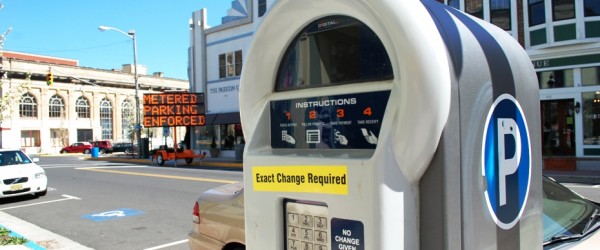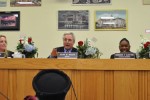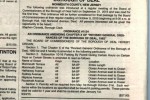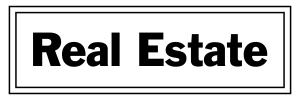Parking policy changes proposed
Impact fee may be lowered from $11,500 to $3,000 per space
To help guide the city in handling parking, city manager Terence Reidy has developed a parking master plan. At the Sept. 19 city council meeting, Reidy and parking consultant Tom Calu unveiled the plan to the council and the public.
“It’s time to take a look at our over-arching plan for parking in the city — how all these different elements impact development and maximize our ability to serve residents, businesses and people who come and visit the city,” Reidy said.
The parking master plan would function as “part of the overall economic redevelopment strategy for the city,” Reidy said. It doesn’t need approval from the council like an ordinance. Instead, it functions as a guide.
One of the plan’s main points is the recommendation to decrease the parking impact fee paid by developers from $11,500 to $3,000.
According to the city’s central business district [CBD] redevelopment plan, a developer must provide 1.5 parking spaces for every new residential unit in the downtown. The developer can also pay a per-space parking impact fee to benefit the city’s parking utility.
The city started with a $25,000-per-space parking impact fee shortly after Reidy began his tenure as city manager in 2003.
“No one paid into that fund,” Reidy said. “People found all kinds of creative ways of either not building or building differently — but they did not pay into that fund.”
About four years ago, the city lowered the fee to $11,500 in hopes of coaxing developers to pay in, but “it really hasn’t been working,” Reidy said. Now, the city may further reduce the parking impact fee to $3,000. This would require an amendment to the CBD plan.
A lower fee could help projects such as the Savoy Theatre redevelopment come to fruition, Reidy said. Redeveloper Carter Sackman has sought the city’s approval to restore the Savoy Theatre, located in the Kinmonth Building at 710 Mattison Ave., and also create 64 studio apartments in the floors above the theatre. This would require the creation of 96 parking spaces or a payment of $1 million into the parking fund, according to the current CBD plan.
Sackman has requested the city lower parking requirements for the Kinmonth project. City council and planning board members have repeatedly said they hope to see the project happen, but cannot completely dismiss the parking requirements. The developer and officials have been unable to reach a solution.
In similar situations, the city and developers have made parking agreements to facilitate development — a practice the city manager hopes to end.
“I’m not comfortable doing that anymore,” Reidy said.
He anticipates the next action to be taken will be the $3,000-per-space amendment to the CBD plan, which the council would need to approve.
“One of the impediments to development in the past seven to 10 years in urban areas and redevelopment is the cost of parking and the need for parking to support development, especially residential development,” Calu said at the meeting.
Calu also told the council it was important for the city to manage parking lots or garages itself, rather than leaving parking in the hands of developers or private land owners. When a developer creates a parking lot, the city could miss out on both parking revenue and property tax revenue, as property tax rates for parking lots are relatively low, Calu said.
The city could purchase the Magyar Bank-owned lot at Bangs Avenue and Bond Street to construct a parking garage with 88 to 90 spaces, with retail and residential on upper floors, Calu said, noting the vacant lot’s price makes it advantageous.
He suggested the city “maximize existing properties” as well, including the transportation center and city hall parking lots. He suggested adding 28 to 30 spaces in those lots.














